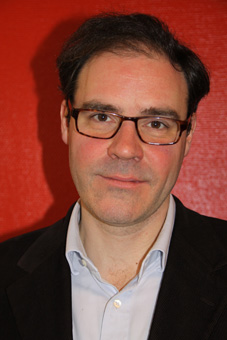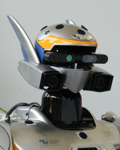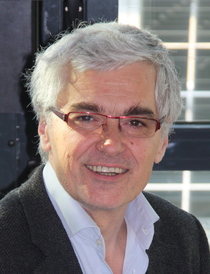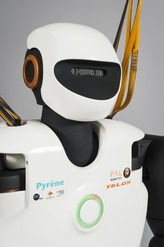Speakers and Summaries
 |
Alain Berthoz
Honorary Professor, Collège de France
|
|
Brains and robots : common principles
To day cooperation between neuroscience and robotics is a nice opportunity for cross fertilization because modern technologies and algorithms developed by roboticians may provide principles which may not have been discovered by evolution. Is there anything in common between languages of the brain and languages of robots? This talk will address the question by taking a few examples of functions which are found in these natural and artificial creatures. Living animals use simplifying principles which allow flexibility, creativity and memory. In particular, in the area of cognitive functions they use space as a tool for storing and retrieving words, facts and concepts with a variety of non Euclidian geometries. The lateralization of language in the left brain corresponds to a more general division of coding schemes between the left and right brain providing a rich dual perspective (egocentric and allocentric) view for action perception and reasoning. But in addition they combine emotion and information processing. This provides them with a unique combination of potential (vicariant) ways to solve problems and for rethorics. All these mechanisms are essential basis for social interaction and argumentation.
|
|
Alain Berthoz is Honorary Professor at the College de France, member of the French Academy of Sciences and the Academy of Technologies, the Academia Europae, American Academy of Arts and Sciences, and other Academies (Royal Academy of Medicin of Belgium, and Academy of Medicine of Bulgaria). He is a world known specialist of the physiology of multisensory integration, spatial orientation, the vestibular system, the oculomotor system, locomotion, and spatial memory. He has contributed to the understanding of the cognitive aspects of sensory-motor pathologies in children, and cognitive functions including recently psychiatric diseases. He has been at the origin of the technical development of a number of biomedical equipments, motion capture, haptic force-feedback devices, eye movement measurement, virtual reality for the study of navigation, locomotor and executive function deficits. He cooperates with robotics groups in Japan and Italy for bio-inspired robotics and humanoids and participated in several Europen projects. He is the author of more than 300 papers in International journals. He wrote several books including “The Brain’s Sense of movement”, "The cognitive foundations of decision making", “Simplexity”, “La vicariance”. He has received the honors of Officier de l’Ordre du Mérite, Officier de la Légion d’Honneur, Commandatore of the Order of Merit of the Italian Republic. Alain Berthoz is Honorary Professor at the College de France, member of the French Academy of Sciences and the Academy of Technologies, the Academia Europae, American Academy of Arts and Sciences, and other Academies (Royal Academy of Medicin of Belgium, and Academy of Medicine of Bulgaria).
|
 |
Pascal Chabot
Professor, IHECS, Brussels
|
|
The multiple ways of being intelligent
What do we mean when we are saying that a human is "intelligent". And what do we deny to a machine when we are opposed to make such a diagnostic?
"Intelligence" is a relationnal quality, and moreover a rhetorical quality, that is to say a quality that does only concern the sphere of the "logos", but also those of "pathos" and "ethos".
By reconsidering on a philosophical and rhetorical point of view those questions, it is all our relations with the machines that appear in a new light.
|
|
Pascal Chabot is philosopher. He is the author of "Exister résister" (Puf, 2017), "ChatBot le robot" (Puf 2016), "L'âge des transitions" (Puf, 2015), "Global burn-out" (Puf, 2013) and "The philosophy of Simondon" (Bloomsbury, 2013) With the filmmaker Francois Lagarde, he had realiazed "Simondon du désert"
He teaches at IHECS (Brussels).
|
 |
Emmanuelle Danblon
Professor, ULBruxelles, GRAL
|
|
Is there a correct way to name actions in humanoid robotics?
“To name things wrongly is to add to the misfortune of the words” said Albert Camus. It is true in philosophical and ethical issues. But “wording robotics” raises questions at two different levels. The first one concerns a humanoid lexicon that is spontaneously used by speakers (decision, autonomy, empathy, etc.). The second one deals with an ethical and philosophical level which is more concerned with Camus reflection. I Would like to propose a distinction between both levels of wording robotics. In the first case, there is no choice for cognitive reasons. But linguistics may contribute to explicit the status of metaphors in the use of humanoid lexicon. In the second case, a debate on wording robotics may —and must— be organised. Finally, emotions at hand in the comparison between artificial and human intelligence are useful to better understand our vision of humanity today.
|
|
Emmanuelle Danblon is Professor at the Free University of Brussels, Belgium.She teaches rhetoric, argumentation and linguistics theory.Her research fields are ancient and contemporary rhetoric, links between genres and institution, teaching rhetoric in education, conspiracy, etc.She published several book and articles on these topics.She is the head of the GRAL (Groupe de Recherche en rhétorique et argumentation linguistique: gral.ulb.ac.be). She is the secretary of the Chaïm Perelman’s Foundation in Brussels.
|
 |
Salvatore Di Piazza
Researcher, University of Palermo
|
|
The stochastic intelligence. A rhetorical model from ancient Greece to robotic
If we want to understand the specific characteristics of human intelligence, an interesting field to investigate is represented by ancient Greek rhetoric and by other epistemologically similar technai stochastikai, conjectural technics. Particularly, it is interesting to analyze the Aristotelian approach to the notion of techne and the multiple meanings related to the Greek verb stochazesthai. This verb, from which the adjective stochastikos is derived, is usually translated as “to conjecture”, “to approximate”, “to aim at”. We can say in general that the verb stochazesthai refers to a non-algorithmic cognitive activity, which is not limited to performing pre-arranged procedures for reaching a goal, but which necessarily elaborates a hypothesis, conjectures and devises in order to reach the target. It actually concerns a specifically human way of rule-following. Which cognitive operations come into play when we deal with a techne stochastike like rhetoric? What does “making a decision” mean for a human being? We will try to show how the analysis of these issues can offer food for thought in the field of robotic with a particular focus on deep learning.
|
|
Salvatore Di Piazza (1977) obtained his PhD on Philosophy of Language and Mind in 2008 and is actually researcher at University of Palermo. He is also associate member of GRAL (Groupe de recherche en rhétorique et en argumentation linguistique) at Université libre de Bruxelles where he received a FNRS grant under the supervision of Emmanuelle Danblon. His researches mainly focus on epistemological aspects of rhetoric, in particular in ancient Greek world (Congetture e approssimazioni. Forme del sapere in Aristotele, Milano, Mimesis, 2011), on ancient semiotics (Seeing the similar in the dissimilar. The semiotics of Philodemus’s De signis, Roma, Aracne, 2014), on the relationship between rhetoric and medicine. Another topic of his research concerns the relationship between language and identity in organized crime (Mafia, langage, identité, Paris, L’Harmattan, 2012). He is actually working on the notion of trust/faith (pistis in Greek) by comparing the religious context (the New Testament, in particular) and the philosophical and rhetorical tradition.
|
 |
Malik Ghallab
Directeur de Recherche Emeritus, CNRS-LAAS, Toulouse
|
|
Describing Robotics: the Safe Grounds and the Risky Shores
I share the view that roboticisits, as other scientists, are accountable to society for the progress and potential impact of their field. Among other things, they have to make robotics understandable enough to allow for social adaptation and decision making.
Metaphors are often used for that purpose, because of their pedagogical properties to transfer a familiar meaning to an obscure target. However, there are limits to metaphors, which are well understood in rhetorics, but not necessarily in robotics, where their use can be harmful. For example, referring to “emotion” for a useful second order heuristic parameter in a navigation function is misleading, if not plain wrong. The wording of robotics faces other challenges, such as a rich collection of myths and our natural inclination to personification and anthropomorphization, i.e., to grant human characteristics to inanimate artifacts. Finally, an appropriate perception and description of the novelties already brought by and to be expected from robotics has necessarily to be set in the broader context of the disruptive computational sciences and technologies.
|
|
The research activity of Malik Ghallab is mainly focused on robotics and AI. He contributed to topics such as object recognition and pattern matching, scene interpretation, heuristics search, unification algorithms, knowledge compiling, temporal reasoning, task planning, monitoring, and learning of robots skills and models of behaviors. He (co-)authored over 200 technical articles in journals and conference proceedings, and several textbooks and monographies.
|
 |
Mark Hunyadi
Professor, UCL, Louvain
|
|
Artificial Moral Agents, really ?
The Artificial Intelligence topic poses the very question of the nature of human intelligence. Likewise, to talk about Artificial Moral Agents (AMAs) poses the very question of human moral action. In what sense can a robot act morally ? In what sense can we talk about doing right and wrong, when robots are concerned ? How could they choose the very grammar in which right and wrong can be distinguished (virtue ethics, deontological ethics, consequencialism, rule utilitarianism,…) ? Against the optimism of some philosophers of cognitive science as well as computer scientists it will be argued that the expression « Artificial Moral Agent » is doomed to stay an oxymoron.
|
|
Mark Hunyadi, professor of moral, social and political philosophy at the Université catholique de Louvain (Belgium) since 2007. Director and founder of the Europé Research Center and member of Louvain Bionics, which is a center of interdisciplinary expertise in medical robotics. Born in Geneva in 1960, he studied in Geneva, Paris and Frankfurt (2 years within Habermas’ research group ; he translated at that time two books of Habermas into French), before being appointed professor at the Université Laval de Québec (Canada, 2004-2007). His work focuses on fundamental as well as applied ethics. His most famous books are Je est un clone (Paris, Seuil, 2004 ; « I is a clone »), L’Homme en contexte (Paris, Cerf, 2012 ; « Man in Context »), and La Tyrannie des modes de vie, which has been translated into Spanish and Italian (Lormont, Le Bord de l’eau, 2015 ; « The Tyranny of ‘modes de vie’ »). All his books study the role and meaning of ethics in a liberal context. He just wrote a book about Posthumanism (Le futurisme ne s’écrit pas au futur. Le posthumanisme et notre temps, 2017, forthcoming).
|
 |
HRP-2 14
Humanoid Robot
|
| HRP-2 is the robotic platform for the Japanese Humanoid Robotics Project (HRP). The robot was designed and integrated by Kawada Industries, Inc. together with the Humanoid Research Group of the National Institute of Advanced Industrial Science and Technology (AIST). The external appearance of HRP-2 was designed by Mr. Yutaka Izubuchi, a mechanical animation designer. HRP-2’s height is 154 cm and its mass is 58 kg, including batteries. It has 30 degrees of freedom (DOF). About twenty copies of the robot exist today. Only one (HRP2-14) left Japan to serve as a research platform for the robotics teams at LAAS-CNRS in Toulouse. CNRS acquired HRP2-14 in 2005 in the framework of the joint French-Japanese laboratory JRL. |
 |
Jennifer Keating
Assistant Dean for Educational Initiatives in Dietrich College
|
|
(Joint Talk with I. Nourbakhsh)
|
|
Jennifer Keating-Miller is the Assistant Dean for Educational Initiatives in Dietrich College, where she also teaches regularly in the Department of English. Her research interests include representations of colonialism, nationalism and gender relations in 19th century British Literature and 20th century Anglophone literature, primarily in Ireland and parts of the Caribbean. She also pursues work pertaining to memoir, legacies of violence and identity formation in societies in strife. Keating-Miller’s current research project, “Performing Peace in the North of Ireland,” focuses on the concept of performance in the ongoing peace process in Northern Ireland. This is supported through the Performance Initiative in the Center for Arts in Society. Her writing has recently appeared in New Hibernia Review and in Outrage: Art, Controversy and Society; and her book, Language, Identity and Liberation in Contemporary Irish Literature, was awarded the Michael Durkan Prize for Best Book on Irish Language and Culture by the American Conference for Irish Studies in 2011. She earned a Ph.D. in English and Cultural Studies at the University of Pittsburgh and holds a B.A. in English and History from the University of Rochester. She has taught at the University of Rochester, University of Pittsburgh and St. John Fisher College.
|
 |
Jean-Paul Laumond
Directeur de Recherche, CNRS-LAAS, Toulouse
|
|
Robotics and Anthropomorphism: the need to understand the wording
Robots are machines. What makes robots new machines? What it is the novelty that makes these machines such a source of oversize both fear and hope at the same time? From the study of robotics genesis and evolution, we will show how mastering computer-based motions has renewed and enlarged the scope of automated machines. Doing so, machines are often perceived as a kind "living" beings endowing with a form of autonomy. By exploring the computational foundations of the relashionship between motion and action, robotics promotes new ways to communicate with the machines. Today machines can be programmed at the level of the action to perform while making transparent for the user all the technical issues. As a consequence, human-machine interactions make use of natural language tinged with anthropomorphism. It is then critical to understand how the language opers in the perception of robots by roboticists themselves and by our contemporaries in general.
|
|
Jean-Paul Laumond, IEEE Fellow, is a roboticist. He is Directeur de Recherche at LAAS-CNRS (team Gepetto) in Toulouse, France. He received the M.S. degree in Mathematics, the Ph.D. in Robotics and the Habilitation from the University Paul Sabatier at Toulouse in 1976, 1984 and 1989 respectively. He has been a co-director of the French-Japanese lab JRL from 2005 to 2008. In 2001 and 2002 he created and managed Kineo CAM, a spin-off company from LAAS-CNRS devoted to develop and market motion planning technology. Siemens acquired Kineo CAM in 2012. In 2006, he launched the research team Gepetto dedicated to Human Motion studies along three perspectives: artificial motion for humanoid robots, virtual motion for digital actors and mannequins, and natural motions of human beings. He teaches Robotics at Ecole Normale Supérieure in Paris. He has published more than 150 papers in international journals and conferences in Robotics, Computer Science, Automatic Control and in Neurosciences. He has been the 2011-2012 recipient of the Chaire Innovation technologique Liliane Bettencourt at Collège de France in Paris (videos of the lectures, seminars and symposia). He is the 2016 recipient of the IEEE Inaba Technical Award for Innovation Leading to Production. He is a member of the French Academy of Technologies. His current project Actanthrope (ERC-ADG 340050) is devoted to the computational foundations of anthropomorphic action.
|
 |
Yoshihiko Nakamura
Professor, University of Tokyo
|
|
Distance betweence language and action
Human motion in time and space is continuous and complex. If the strategy of nature is to compress the information and store in the limitted resourse of memory, discretization and classification in category would be natual and efficient from the information science point of view. We have proposed a statistical model for motion data and then connected to the statistical language model. In this talk we introduce the basic concenpts and recent research results with possible applications.
|
|
Yoshihiko Nakamura is Professor at Department of Mechano-Informatics, University of Tokyo. Humanoid robotics, cognitive robotics, neuro musculoskeletal human modeling, biomedical systems, and their computational algorithms are the current fields of research. He is Fellow of JSME, RSJ, IEEE, and WAAS. He is also Foreign Member of Academy of Engineering Science of Serbia, and TUM Distinguished Affiliated Professor of Technische Universität München.
|
 |
Illah Nourbakhsh
Professor, CMU
|
|
AI and Humanity: A Freshman Class Experiment
We believe the social significant of AI requires students across diverse disciplines to have early and deep exposure to AI and its ramifications on humanity as a basic part of the core educational experience. In this talk, we describe a new experiment in transdisciplinary education at Carnegie Mellon University, where a historical and future-facing understanding of Artificial Intelligence is combined with the historical background of the power dynamics of slavery, post-colonial society and an analysis of the ways in which AI may challenge our future social fabric.
|
|
Illah R. Nourbakhsh is Professor of Robotics, Director of the Community Robotics, Education and Technology Empowerment (CREATE) lab and Associate Director for robotics faculty at Carnegie Mellon University. His current research projects explore community-based robotics, including educational and social robotics and ways to use robotic technology to empower individuals and communities. The CREATE Lab's programs have already engaged more than 40,000 people globally, and the CREATE Satellite program is forging additional CREATE lab partners in new geographic zones. While on leave from Carnegie Mellon in 2004, he served as Robotics Group lead at NASA/Ames Research Center. He was a founder and chief scientist of Blue Pumpkin Software, Inc. Illah earned his bachelor's, master's and PhD in computer science at Stanford University and has been a faculty member of Carnegie Mellon since 1997. In 2009, the National Academy of Sciences named him a Kavli Fellow. In 2013 he was inducted into the June Harless West Virginia Hall of Fame. He is a trustee of the Claude Worthington Benedum Foundation, and he is Chairman of the Board of Directors of the Southwestern Pennsylvania Environmental Health Project. He is a member of the Global Future Council on the Future of AI and Robotics for the World Economic Forum, and the IEEE Global Initiative for the Ethical Considerations in the Design of Autonomous Systems, the Global Innovation Council of the Varkey Foundation and Senior Advisor to The Future Society, Harvard Kennedy School.
|
| |
Céline Pieters
PhD Candidate, INSA Toulouse - ULBruxelles
CNRS-LAAS, Toulouse
|
|
Rhetoric and robotics
As humans challenge their expectations about robots, they wish to gain a better understanding of the field of robotics. For this purpose and regardless of whether they are the European Parliament or the public in general, the first step consists in consulting experts in the field. Unfortunately, the dialogue between the public and the roboticists is not always efficient. There is a gap between robotics as it is perceived by the public and robotics as it is actually practiced. And this gap is especially obvious as we compare the causes of wonder of the public and the ones of roboticists facing moving machines. There exist multiple reasons for the human brain to project intentions, wishes, feelings, etc. on an artefact. The shape of the object (anthropomorphism), the context in which this object is discovered, the habit of interacting with the artefact, etc. Within the physical space, movement is a necessary condition for the human brain to consider spontaneously an artefact as a living organism. But how does it work? What is the relation between robots’ motions/actions, projection of intentionality (intentional stance) and the lexicon, i.e. the words used to describe robots? When is there a problem and why? Is it different to “vulnerable people and children” then to others and to roboticists?
|
| Céline Pieters is a PhD Candidate at the Free University of Brussels, Belgium and the National Institute of Applied Sciences Toulouse, France. She studied at the Free University of Brussels where she did a Master Degree in Publishing and Information, and a Master Degree in Education (French language). She also followed a 7months program in sociolinguistics at Háskóli Íslands University, Reykjavík, Iceland within a European Action Scheme for Mobility of University Students. She conducts her PhD research within the LAAS, CNRS, Toulouse in the department of robotics, in the team Gepetto, and she is a member of the GRAL (Groupe de recherche en Rhétorique et en Argumentation Linguistique). |
 |
Pyrène
Humanoid Robot
|
|
Pyrene is the first prototype of the TALOS series. It was designed and integrated by PAL Robotics, Spain, and specified by the Gepetto TEAM from LAAS-CNRS, France. It was based on the work and experience from the Gepetto TEAM on creating new algorithms for motion generation and it is the fourth generation of humanoid robots designed by PAL Robotics. Pyrene is 1.75 m tall and its mass is 95 kg including batteries. It has 37 degrees of freedom (DOF).
The humanoid robot Pyrene was acquired in the frame of the Actanthrope project, and with the help of the CNRS INSII - Institute on Science on Information and Communications Technology.
|
 |
Gentiane Venture
Researcher, Tokyo University of Agriculture And Technology
|
|
Speaking about robots: my trilingual daily challenge
French is my native language, English is my research language and Japanese is my teaching language. Every day I juggle in my professional environment with these three languages, that have very different characteristics. And mainly I talk about robots. While acquiring this ability over the years, I have encountered many linguistic issues that are unique to each language and to when talking about robots. These issues are not language issue per-se, they are mainly related to the ambiguous definition and position of the robots. Indeed, even if robots and humans are ontologically different, robots are nothing like common artifacts. In this presentation, I will show some of the difficulties encountered when talking about robots and how I try to overcome them.
|
| Gentiane Venture is a French Roboticist who has been working in academia in Tokyo, Japan for more than 10 years. After graduating from Ecole Centrale de Nantes and obtaining a PhD from University of Nantes in 2000 and 2003 respectively, she works at the French Nuclear Agency and at the University of Tokyo. She started in 2009 with Tokyo University of Agriculture and Technology where she has established the GVlab, an international research group working on human science and robotics. The researchers at the GVlab try to encompass human motion dynamics and non-verbal communication into complex intelligent robot behavior design to achieve personalized human machine interaction. The work of her group is highly interdisciplinary by collaborating with therapists, sociologists, psychologists, physiologists, philosophers, neuro-scientists, ergonomists, bio-mechanists, designers worldwide… |
 |
Denis Vidal
Directeur de Recherche, IFRD, Paris
|
|
What is an 'artificial person'?
An anthropological perspective on humanoid robots
There has been an ongoing debate in anthropology, practically from the origins of the discipline, about the notion of the ‘person’ - how it should be defined and how it may vary from one society to another. In this paper I will draw on these debates in order to highlight what is at stake when people discuss humanoid robotics, worrying, for example, about the idea that an ‘artificial person’ may threaten our very conceptualization of human nature. At the same time I will argue that, in order to better understand some of the fundamental issues associated with humanoid robotics, one should take into account the concrete choices made by roboticists in order to build the different parts of humanoid robots when they model them on human beings. And it is also worth analyzing what sort of concept of the person is put into use when people interact with humanoid robots. To consider these various issues, I will reflect on ethnographic data collected while following the making of an humanoid robot (Romeo) in a robotic company setting (Aldebaran) as well as documentation of people’s interactions with another humanoid robot (Berenson) in the context of the Musée du Quay Branly in Paris.
|
|
Denis Vidal is a social anthropologist, Directeur de recherche at the Institut Français de Recherche sur le Développement (URMIS Paris Diderot). He is also an associate research fellow at the Centre d’étude de l’Inde et de l’Asie du Sud ( EHESS, Paris) and he teaches at L’Ecole des Hautes Etudes en Sciences Sociales et au Musée du Quai Branly. He has conducted long term research in India and has been working for many years on visual anthropology and the anthropology of techniques. He studied, in particular, up to which point the notion of a ‘person’ can be extended to artefacts, whether ‘traditional’ contexts such as religious rituals or in more ‘contemporary’ ones such as robotics. He works in association with Philippe Gaussier and a team of researchers at the ETIS laboratory on the conceptualisation of the humanoïd robot, Berenson. In 2016 he was one of the curators of the exhibition Persona, at the Musée du Quai Branly. His most recent book, Aux frontières de l'humain, Dieux, figures de cire, robots et autres artefacts, was published in Paris by Alma Editeurs in 2016.
|
 |
Agnieszka Wykowska
Senior Researcher, IIT, Genova
|
|
Adopting the Intentional Stance towards humanoid robots
In daily lives, we need to predict and understand others’ behaviour in order to efficiently navigate through our social environment. When making predictions about what others are going to do next, we refer to their mental states, such as beliefs or intentions. At the dawn of a new era, in which robots will be among us at homes and offices, one needs to ask whether (or when) we predict and explain also robots’ behaviour with reference to mental states. In other words, do we adopt the intentional stance (Dennett, 1989) also towards artificial agents – especially those with humanoid shape and human-like behaviour? What plays a role in adopting the intentional stance towards robots? Does adopting intentional stance affect our social attunement with artificial agents? In this talk, I will first discuss the general approach that we take towards examining these questions – using objective methods of cognitive neuroscience together with non-verbal Turing tests. Then I will present results of studies in which we investigated various factors influencing adoption of the intentional stance, such as social presence, mutual gaze and human-like behaviour, as well as results showing that adopting intentional stance influences social attunement. The talk will conclude with an outlook to the future – questions that still need to be addressed, societal impact of robots with whom we attune socially, and a discussion of how human-like should robot behaviour be, to evoke adoption of intentional stance, and not to lead to potential ethical issues.
|
|
Agnieszka Wykowska is PI of the Social Cognition in Human-Robot Interaction (S4HRI) research line at the Italian Institute of Technology, Genova. She is also affiliated with the Luleå University of Technology, Sweden as adjunct professor in Engineering Psychology. Her research focuses on social cognitive neuroscience and human-robot interaction. She uses behavioral measures (eyetracking, psychophysics) and EEG in HRI research. She obtained PhD in Psychology from the Ludwig-Maximilians-University in Munich (LMU) in 2008. Her background is cognitive neuroscience (M.Sc. in neuro-cognitive psychology, LMU, 2006) and philosophy (M.A. in philosophy, Jagiellonian University Krakow, Poland, 2001). She is an Associate Editor of the International Journal of Social Robotics, and she has served as a member of the Program Committee for the International Conference on Social Robotics (2010-2016), Human-Agent Interaction (2016, 2017) and Human-Robot Interaction (2016). In 2013 she received an Early Stage Career Prize at the COST meeting “The future concept and reality of Social Robotics: challenges, perception and applications - Role of Social Robotics in current and future society”. In 2016 she has been awarded an ERC Starting Grant “Intentional Stance for Social Attunement” which will be carried out at the Italian Institute of Technology.
|
Enregistrer
|

